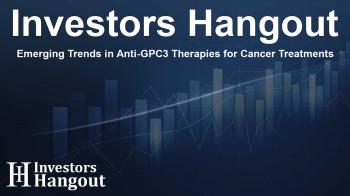Emerging Trends in Anti-GPC3 Therapies for Cancer Treatments

Growth of Anti-GPC3 Therapies Market
The anti-GPC3 targeted therapies market is on the rise, largely spurred by the increasing incidence of various cancers and robust clinical pipeline activities. This market is showing great promise in addressing pressing needs in the treatment landscape for conditions such as hepatocellular carcinoma (HCC) and non-small cell lung cancer (NSCLC). Several prominent companies including Bayer, Carisma Therapeutics, Moderna, Eureka Therapeutics, AstraZeneca, and CRISPR Therapeutics are at the forefront of developing innovative anti-GPC3 therapies.
Overview of Anti-GPC3 Targeted Therapies
Anti-GPC3 targeted therapies are gaining traction as an effective approach in treating hepatocellular carcinoma and other GPC3-expressing malignancies. Glypican-3 (GPC3) has emerged as a highly specific tumor-associated antigen, allowing for targeted treatments that minimize toxicity to healthy tissues. This precision opens the door for the development of various therapeutic formats, including antibody-drug conjugates (ADCs), CAR T-cell therapies, and bispecific antibodies.
Key Players in the Anti-GPC3 Space
Leading companies such as Eureka Therapeutics and AstraZeneca are investing in novel anti-GPC3 therapies aimed at enhancing patient outcomes. For instance, Eureka's ECT204 is an experimental ARTEMIS T-cell therapy designed specifically to target GPC3, demonstrating a focus on improving penetration into solid tumors.
Pipeline Developments and Trials
Several promising therapies are currently in the pipeline, with notable candidates such as AZD9793 from AstraZeneca, which leverages a first-in-class trispecific IgG1 monoclonal antibody engaging CD8+ T cells with GPC3-positive tumors. This innovative mechanism of action highlights the evolving landscape of targeted therapies that aim to improve the efficacy and safety of cancer treatments.
Market Dynamics and Challenges
The dynamics of the anti-GPC3 therapies market are shaped by the urgent demand for effective treatment options, particularly for HCC. Despite the positive momentum, the market faces challenges including tumor heterogeneity, immunosuppressive environments, and the complexities of therapy manufacturing. These hurdles could impact the development and accessibility of personalized therapeutic approaches, although innovations in ADCs may offer scalable solutions.
Potential for Expanding Indications
Interestingly, GPC3 is also being studied in other solid tumors such as ovarian clear cell carcinoma and lung squamous cell carcinoma, potentially widening the market scope and inviting further investments. The success of therapies targeting GPC3 could foster the advancement of next-generation constructs, such as dual-targeting CAR-Ts.
Future Outlook for Anti-GPC3 Therapies
As the anti-GPC3 therapies market evolves, continuous collaboration among biotech innovators, academia, and pharmaceutical companies will play a crucial role in accelerating the development of these promising treatments. With increased validation from ongoing clinical trials, GPC3-targeted therapies hold the potential to redefine treatment paradigms for GPC3-expressing tumors, ultimately aiming for improved patient access and outcomes.
Frequently Asked Questions
What are anti-GPC3 therapies?
Anti-GPC3 therapies are targeted treatments that aim to inhibit the glypican-3 protein, which is overexpressed in certain cancers, thereby offering a more directed therapeutic approach.
Which cancers are targeted by anti-GPC3 therapies?
Main cancers targeted include hepatocellular carcinoma (HCC) and non-small cell lung cancer (NSCLC), but research is expanding to include others as well.
What challenges does the anti-GPC3 therapies market face?
Challenges include biological complexities such as tumor heterogeneity and immunosuppressive environments, as well as regulatory and manufacturing hurdles.
Which companies are leading in anti-GPC3 therapies development?
Key players include Bayer, AstraZeneca, Eureka Therapeutics, and CRISPR Therapeutics, all actively enhancing their pipelines for GPC3-targeted treatments.
What is the future outlook for the anti-GPC3 therapies market?
The future looks promising with continued innovations and collaborative efforts expected to lead to new treatment options and improved patient outcomes in oncology.
About The Author
Contact Henry Turner privately here. Or send an email with ATTN: Henry Turner as the subject to contact@investorshangout.com.
About Investors Hangout
Investors Hangout is a leading online stock forum for financial discussion and learning, offering a wide range of free tools and resources. It draws in traders of all levels, who exchange market knowledge, investigate trading tactics, and keep an eye on industry developments in real time. Featuring financial articles, stock message boards, quotes, charts, company profiles, and live news updates. Through cooperative learning and a wealth of informational resources, it helps users from novices creating their first portfolios to experts honing their techniques. Join Investors Hangout today: https://investorshangout.com/
The content of this article is based on factual, publicly available information and does not represent legal, financial, or investment advice. Investors Hangout does not offer financial advice, and the author is not a licensed financial advisor. Consult a qualified advisor before making any financial or investment decisions based on this article. This article should not be considered advice to purchase, sell, or hold any securities or other investments. If any of the material provided here is inaccurate, please contact us for corrections.

